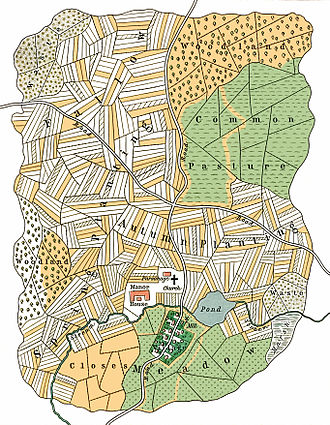Common land
Common land is a type of land ownership where the land is owned collectively by a number of persons or by one person, but others have certain traditional rights to use parts of the land for specific purposes. These rights can include the right to graze livestock, collect firewood, or fish, among others. The concept of common land has a long history and varies significantly from one country to another, reflecting local customs, traditions, and laws.
History
The history of common land dates back to medieval Europe, where much of the land was held in common by villages for grazing livestock and collecting resources necessary for daily life. This system allowed communities to manage resources sustainably over centuries. However, with the advent of the Enclosure movement in the 16th century, much of this land was privatized, leading to significant social and economic upheaval.
Legal Status
The legal status of common land varies widely. In England, for example, common lands are protected under the Commons Act 2006, which provides a modern legal framework for the management and protection of commons. Other countries have their own laws and regulations, reflecting the diverse approaches to managing these lands.
Rights and Responsibilities
Rights to use common land are known as "common rights" and can include:
- Grazing animals
- Collecting firewood or peat
- Fishing and hunting
- Gathering wild plants and berries
These rights are often attached to specific pieces of property in the vicinity of the common land, rather than to individuals. Alongside these rights, there are also responsibilities, including maintaining the health of the land, ensuring sustainable use, and respecting the rights of other users.
Management
The management of common land is typically overseen by local or traditional authorities, such as a Commoners' Council in England. These bodies are responsible for ensuring that the land is used sustainably and that the rights and responsibilities of all parties are upheld.
Challenges
Common lands face numerous challenges, including overgrazing, pollution, and the encroachment of development. Balancing the needs of local communities with conservation efforts is a complex task that requires ongoing management and negotiation.
Conservation
Conservation of common lands is crucial for protecting biodiversity, traditional ways of life, and local ecosystems. Many common lands are now recognized as important sites for conservation, with efforts focused on restoring habitats, protecting wildlife, and promoting sustainable use of resources.
Conclusion
Common land represents an important cultural and ecological resource, embodying centuries of tradition and community management of natural resources. Despite the challenges they face, these lands continue to play a vital role in rural economies and ecosystems around the world.
Transform your life with W8MD's budget GLP-1 injections from $125.
W8MD offers a medical weight loss program to lose weight in Philadelphia. Our physician-supervised medical weight loss provides:
- Most insurances accepted or discounted self-pay rates. We will obtain insurance prior authorizations if needed.
- Generic GLP1 weight loss injections from $125 for the starting dose.
- Also offer prescription weight loss medications including Phentermine, Qsymia, Diethylpropion, Contrave etc.
NYC weight loss doctor appointments
Start your NYC weight loss journey today at our NYC medical weight loss and Philadelphia medical weight loss clinics.
- Call 718-946-5500 to lose weight in NYC or for medical weight loss in Philadelphia 215-676-2334.
- Tags:NYC medical weight loss, Philadelphia lose weight Zepbound NYC, Budget GLP1 weight loss injections, Wegovy Philadelphia, Wegovy NYC, Philadelphia medical weight loss, Brookly weight loss and Wegovy NYC
|
WikiMD's Wellness Encyclopedia |
| Let Food Be Thy Medicine Medicine Thy Food - Hippocrates |
Medical Disclaimer: WikiMD is not a substitute for professional medical advice. The information on WikiMD is provided as an information resource only, may be incorrect, outdated or misleading, and is not to be used or relied on for any diagnostic or treatment purposes. Please consult your health care provider before making any healthcare decisions or for guidance about a specific medical condition. WikiMD expressly disclaims responsibility, and shall have no liability, for any damages, loss, injury, or liability whatsoever suffered as a result of your reliance on the information contained in this site. By visiting this site you agree to the foregoing terms and conditions, which may from time to time be changed or supplemented by WikiMD. If you do not agree to the foregoing terms and conditions, you should not enter or use this site. See full disclaimer.
Credits:Most images are courtesy of Wikimedia commons, and templates, categories Wikipedia, licensed under CC BY SA or similar.
Contributors: Prab R. Tumpati, MD





